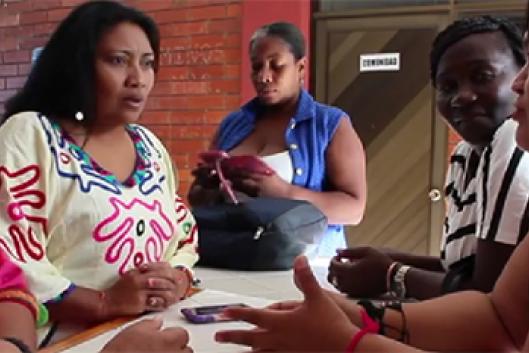If they touch our blood, they touch the earth
If they touch the earth, they touch our blood
Motto of the Women of the Xinka Peoples (Guatemala)
The development policy of the latest national governments in Colombia has prioritized the extraction of natural resources for export through large-scale exploitation. In order to do this, “investor confidence” has become part of the discourse to justify the promotion of politics, programs and projects that favor large transnational mining and oil companies. As the extractive frontier advances and extractive projects are consolidated, mainly for oil and mining, so too grow struggles to defend territories, water and life, many of which are led by women.
In Santander, for several years women from the Sogamoso River have been fighting to defend their territory against the hydroelectric project that has usurped the river's name. In 2011, women from northern Cauca marched to reject illegal and legal mining that disturbs their peace and does not guarantee their right to good living. In Piedras, Tolima, a group of women was at the heart of the first referendum against mining that took place in Colombia. In la Guajira women have been organizing to defend their territory from coal mining that has been going on for many decades; all over the country, women are crucial in anti-extractive struggles, and their voices and proposals are increasingly present when confronting policies and projects.
A similar situation exists throughout Latin America. In Honduras, it is impossible to imagine the contra-hegemonic social process without remembering the role of Berta Cáceres, recently murdered; in Ecuador, indigenous and environmentalist women have led many movements in defense of territory; in Perú, Máxima Acuña Atalaya, a peasant woman, stood up to mining company Yanacocha and the police to defend her territory from the Conga mining project in Cajamarca. Máxima was recently awarded the Goldman Environmental Prize, which is given to outstanding defenders of nature. At the organizational level, there is the Latin American Network of Women Defending Nature, which articulates women's processes from México to the Southern Cone of the continent.
In this context, and for over two decades, Censat Agua Viva (Friends of the Earth Colombia) has accompanied communities and organizations defending their territories against the advance of extractive processes. In 2011, the deepening extractive model incited social struggles in defense of water and life, and women's participation in those processes was increasingly evident. For this reason, we decided to convene the Women and Mining National and International Meeting, in order to socialize the scope of the national mining policy and development plan, as well as the impacts on women, and the alternatives they and their communities build to defend their lives, bodies and territory. Women from various Latin American countries and different regions of the country actively participated in this gathering, enabling a diagnostic of mining's impact on women's lives, territories and communities, and the identification and socialization of community resistance actions in defense of territory and the ways in which women are involved in these processes.
In 2013, a group of approximately 45 women from Caquetá, Santander, Guajira, Meta, Chocó, Tolima, Norte de Santander, Putumayo, Cauca, Antioquia, Boyacá, Cundinamarca, Bogotá, Vaupés, was convened to form the Women and Mining Sustainability School. Participating women come from peasant, indigenous, black, environmental and urban organizations.
This formative process enabled the exchange of experiences and a deepened reflection on the effects on the social and cultural relations of women who live in areas where extractive activity takes place. This work allowed for recognition of the direct effects on women's bodies and strengthened the position to defend territory-body in order to defend territory-earth; emphasizing their relationship with the commons, especially with water.
Women have strengthened the appreciation of traditional knowledge and culture in organizational processes, and they have helped democratize community and social organizations. The emphasis on the economy, the defense of the territory and culture in the hands of women, leads to collective reflection and strengthened community ties. However, women's insertion into different spaces and resistance processes still requires systematic and constant work, since many political and social spaces in the country are made by men and for men.
About our documentary exercise
For over four years, we captured the organizational and formational dynamics and gatherings of women at the Sustainability School in audiovisual material; we traveled different regions to accompany them and record their struggles, demonstrations and protests.
The documentary, “Women Defending Territories” (1) shows the difficulties that women suffer, which Berta Cáceres characterized as the “capitalist, racial and patriarchal system,” which is based on a “transnational dictatorship” that functions by evicting communities from their territory, and in particular violates the lives of women. Mining, in the words of Lorena Cabnal, exerts violence on bodies and nature.
Those who defend life and territory constantly face local contexts of repression and aggression. Women defending territories face frequent harassment, threats, and persecution by the states, armed groups, private companies and even male colleagues in their organizations who oppose women's participation and leadership. Impunity reigns in the face of these attacks. Therefore women alongside their organizations have had to generate strategies to stand up to persecution and death threats, and to being the object of criminalization.
Yet women not only denounce, the documentary shows; they are also the seeds of mobilization and resistance. Women march, organize autonomous referendums so that communities and citizens can express their rejection of mining in their territory, they strengthen their arguments, build economic proposals, and foster strategies to care for life and territory.
The documentary also shows the diversity of struggles of these indigenous, peasant, Afro-Colombian and urban women who are weaving solidarity, strength, proposals, knowledge and memory to continue mobilizing and actively building in their local communities, and forging bonds of solidarity between their struggles and other processes in Latin America.
Enjoy the video!
Censat Agua Viva, Colombia
http://censat.org/
Watch the video at: http://censat.org/es/videos/mujeres-defendiendo-territorios
